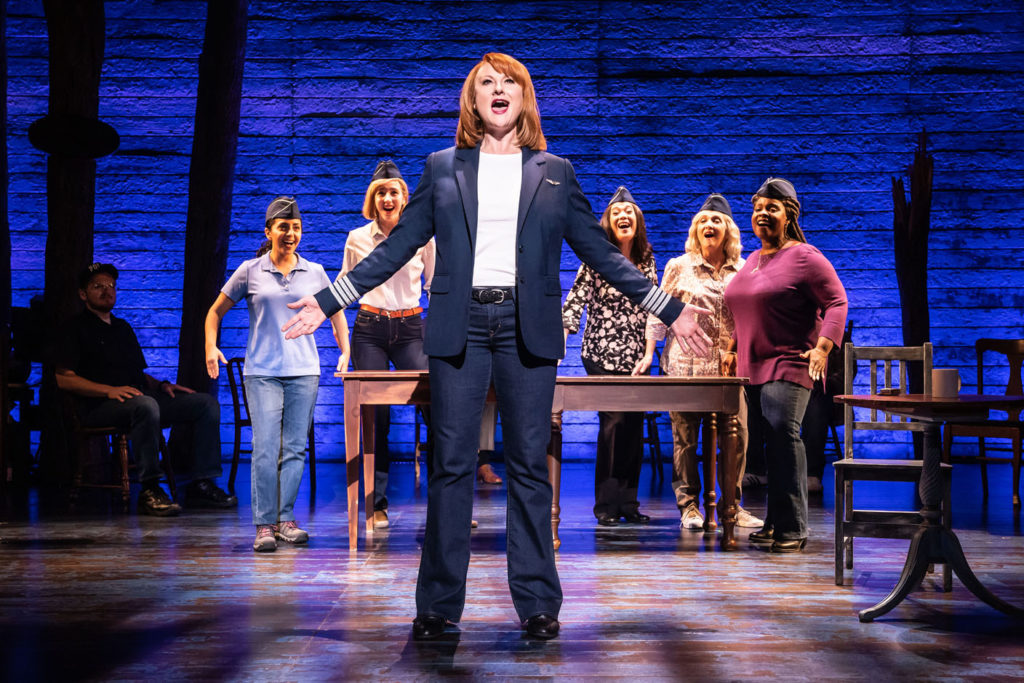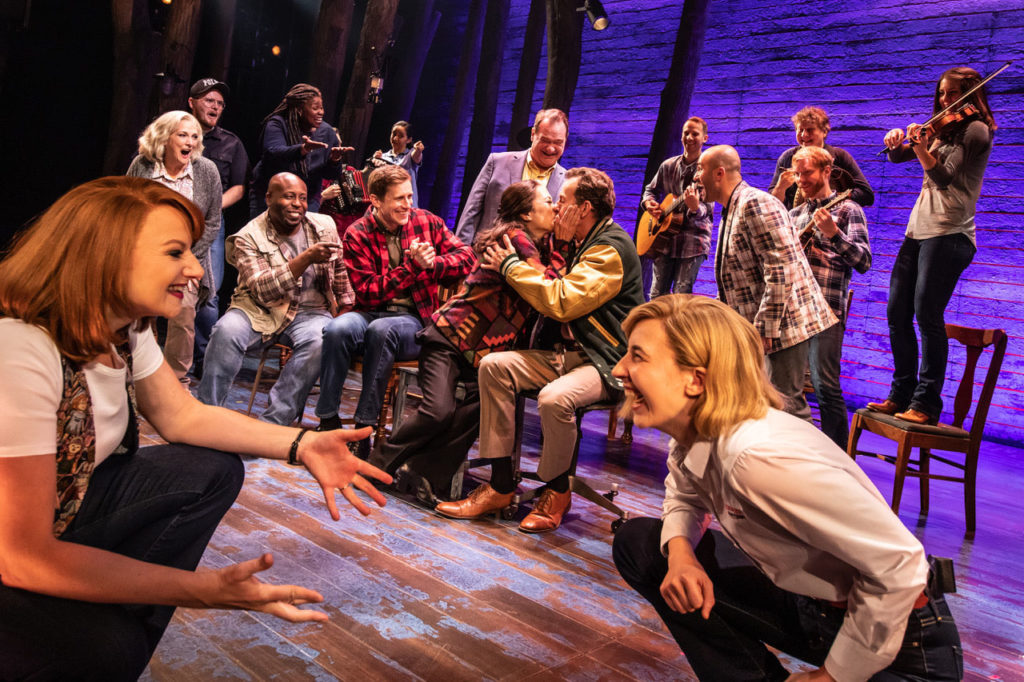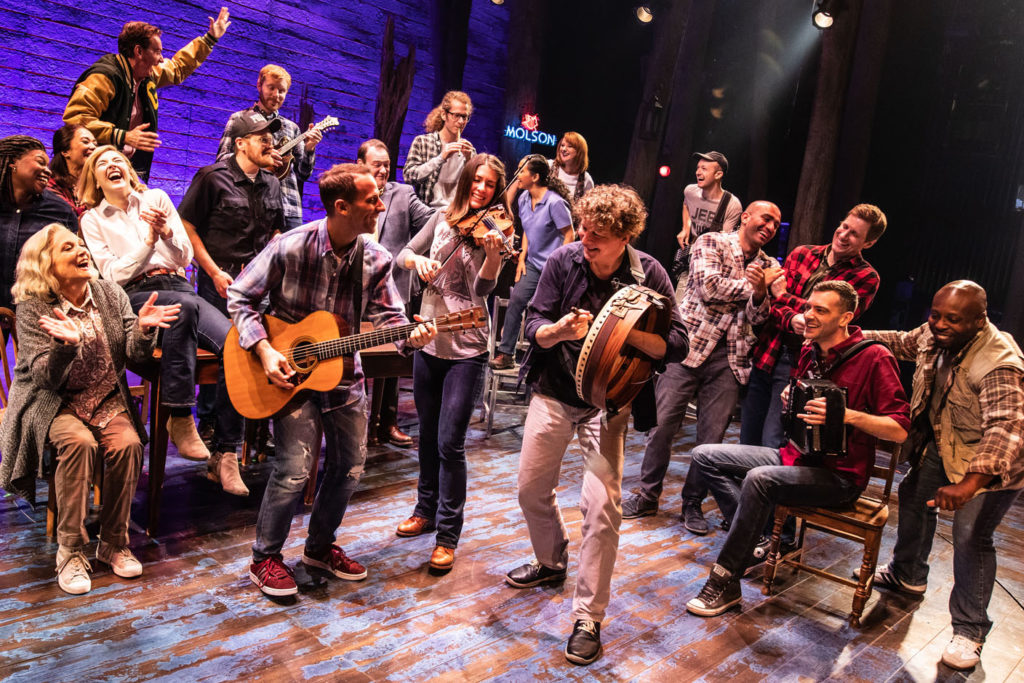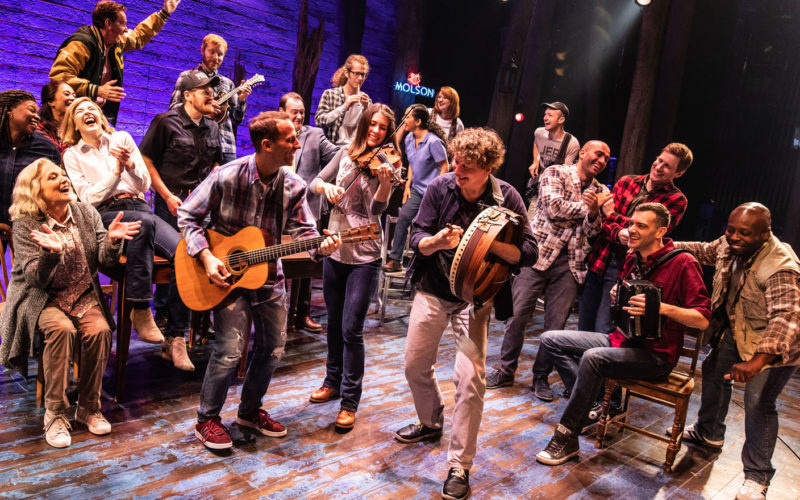LARA JO HIGHTOWER/Special to the Free Weekly
It was several years after the terrorist attacks on Sept. 11, 2001, that David Hein and Irene Sankoff were approached by friend and producer Michael Rubinoff with the idea to create a musical. It would relate the story of 38 planes forced to emergency land in — and be embraced by — tiny Gander, Newfoundland, that day.
“I think he had actually approached five or six other writing teams, and they had all said no — because they thought a 9/11 musical was a terrible idea,” says Sankoff of the process that would become the couple’s award-winning musical, “Come From Away,” opening on the Walton Arts Center’s Baum Walker stage Oct. 26. “But somehow it resonated with us. It felt very similar to what we had gone through, and the kindness that we had seen.”
Sankoff and Hein were in New York City on that tragic day, living in a residence hall for international graduate students.
“There were 700 students from 110 countries around the world, and that community of international people who were stranded in New York at the time all came together,” Hein says. “We saw so much kindness in response — people volunteering, people overcoming their differences, people being good to one another, to be neighbors. People thanked us, as Canadians, for taking planes, and we barely knew what they were talking about.”
Hooked on the idea, the duo started researching — and found out they were starting the project just in time: a 10-year anniversary commemoration was in the works in Gander.
“All of these ‘come-from-aways’ were returning to reunite with the lifelong friends they had made there, to celebrate all the love and kindness they had seen,” says Hein. The husband-and-wife writing team tagged along and managed to interview dozens of Canadians and “come-from-aways” about their experiences during the two days before air travel resumed on Sept. 13. The result is a joyous, emotional and, above all, warm-hearted Tony, Drama Desk and Outer Critics Award-winning musical that Ben Brantley in The New York Times called a “big bear hug of a musical.” “Even the most stalwart cynics may have trouble staying dry-eyed during this portrait of heroic hospitality under extraordinary pressure,” he added.
“We didn’t set out to tell a 9/11 story,” says Hein. “In fact, we wanted to be really, really good to anyone who had been directly or indirectly affected by that — so many people have trauma about that day, and rightfully so. So we wanted to tell a 9/12 story. We wanted to tell a story about how these friends of ours — who we had fallen in love with, going out there — had had been so generous and so kind and so courageous and so good in response to a tragedy.
“As writers, we’re very cautious about the words that we use,” Hein explains. “We only use the word ‘terrorism’ or ‘terrorist’ once. We say ‘the World Trade Center’ only once in the show. We really want to bring people to Newfoundland and say, ‘Come with us. There’s an incredible story that happened in response to this.’ And since then, it’s been a real gift for us, because there are countless tragedies that happen every day on our social media that we see, and division, and this story becomes a model for how we can respond to dark times.”
The story is remarkable: When air space in the United States was closed at 9:45 a.m. on Sept. 11, all planes in flight at the time were diverted to the nearest airports to land. Thirty-eight of those flights — carrying almost 7,000 passengers — were diverted to Gander International Airport, nearly doubling the small town’s population. With the town’s 500 hotel rooms reserved for pilots and flight crew, the citizens of Gander quickly mobilized, turning schools, churches and community centers into temporary housing. Grocery store shelves were nearly cleared as the townspeople worked together to feed the crowd. And in a time of uncertainty, terror and heartbreak, they comforted the travelers, treating them like members of their own families.
“People there told us that they were raised to just always share with their neighbors — and part of that is living in a place that’s called ‘the rock in the middle of the ocean’,” says Hein. “It’s a hard place, with hard winters, where people come together as a community to stay warm. But also, there’s just a feeling that you are good to one another because that’s just what you do. Whenever we would say, ‘It’s extraordinary,’ they would only see it as ordinary. It’s a good reminder that people can be like that.”
Sankoff says interviewing the people and hearing the folk music of Newfoundland helped cement the style of storytelling the musical would utilize.
“When we were interviewing people, I admittedly had the most traditional musical formula in my head, and I was like ‘Oh my gosh, there are so many so many wonderful stories — how are we ever going to pick one?” she remembers. “I just loved the things that people were actually saying, and I wanted to use some stuff verbatim, so I thought — maybe this isn’t a musical. Maybe this is more like ‘The Laramie Project’ or even, possibly, an ‘Our Town’ sort of thing, where people are addressing the audience and telling them their stories. But David said, ‘Just wait. Just wait to hear the music, and then you’ll know.’ And once I heard the music, I turned to him and said, ‘Oh my God, you’re right. This has to be a musical, because you can’t tell a story about this without Newfoundland music.”
“It’s really in their DNA,” adds Hein. “Our first night there, there was a benefit concert for the 10th anniversary, and when the band started playing, everyone started dancing — the locals, and the come-from-aways, and the executives from Lufthansa in their three-piece suits. Everyone just started swinging each other around and just instantly became a community. It’s exactly what we wanted to do — a Newfoundland kitchen party, where everyone brings over their instruments and their stories and their songs, and they invite everyone from the community and come together to get through this together.”
And, in truth, after the last 19 months, seeing a show that celebrates the unifying power of community sounds like the perfect way to celebrate the slow awakening of live theatrical events.
“We agree with that,” says Hein, laughing. “The show has been a gift to us. A show about coming together and overcoming our differences and taking care of our community feels more relevant, now more than ever.”

Ben Brantley in The New York Times called “Come From Away” a “big bear hug of a musical.” “Even the most stalwart cynics may have trouble staying dry-eyed during this portrait of heroic hospitality under extraordinary pressure,” he added. (Courtesy Photo/Matthew Murphy) 
“We didn’t set out to tell a 9/11 story,” says playwright David Hein. “In fact, we wanted to be really, really good to anyone who had been directly or indirectly affected by that — so many people have trauma about that day, and rightfully so. So we wanted to tell a 9/12 story. We wanted to tell a story about how these friends of ours — who we had fallen in love with, going out there — had had been so generous and so kind and so courageous and so good in response to a tragedy.” (Courtesy Photo/Matthew Murphy) 
Asked to tell the story of the planes and passengers diverted to a tiny Newfoundland town on Sept. 11, 2001, playwrights David Hein and Irene Sankoff created “a Newfoundland kitchen party, where everyone brings over their instruments and their stories and their songs, and they invite everyone from the community and come together to get through this together.” “Come From Away” opens Oct. 26 at the Walton Arts Center. (Courtesy Photo/Matthew Murphy)
__
FAQ
‘Come from Away’
WHEN — 8 p.m. Oct. 29-30; 1:30 p.m. Oct. 28; 2 p.m. Oct. 30-31
WHERE — Walton Arts Center, 495 W. Dickson St., Fayetteville
COST — $41-$82
INFO — 443-5600
FYI — All patrons age 12 and older are required to provide proof of full vaccination (final dose at least two weeks prior to the show). Vaccination cards, printed copies of vaccination cards or a photo on your device will be accepted. OR provide printed and dated proof of a negative covid-19 diagnostic (PCR or antigen) test taken within 72 hours to attend a show. Children age 11 and younger can attend with printed proof of a negative covid-19 test taken within 72 hours prior to entry. All patrons will also be required to wear a mask while inside Walton Arts Center.










